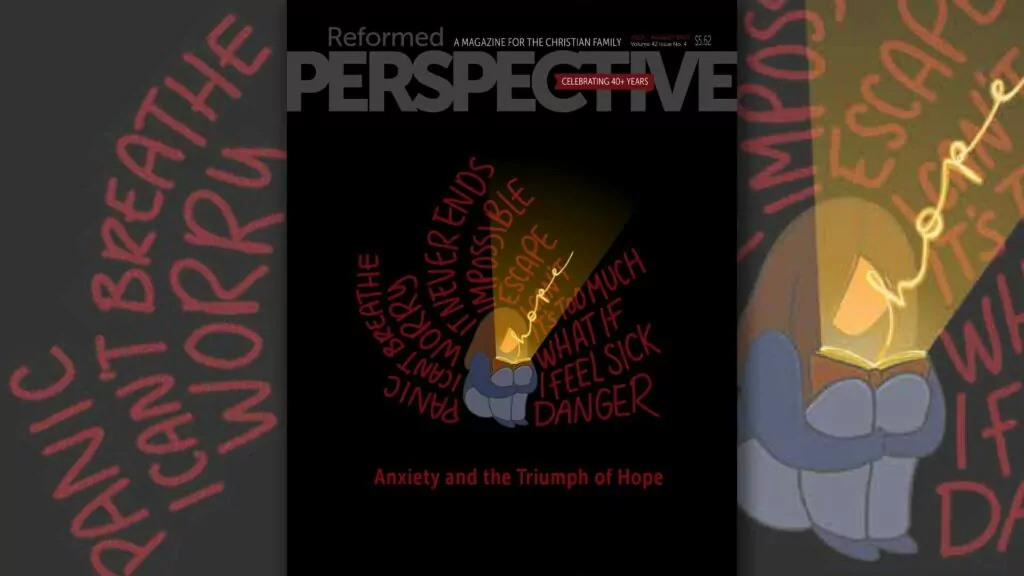Rev. Dirk Poppe is serving as the pastor of the Southern River Free Reformed Church, in Western Australia. Prior to this he served as pastor of churches in BC & Alberta. Dirk is married to Amanda, and the LORD has blessed them with six children. Shortly after I was married, my wife and I moved to Southern Alberta where we had the privilege of being shepherded by Rev. Poppe. His care for the hearts and well-being of the flock was very evident, and he was also one of the first to speak to me about the value of biblical counseling.
Knowing the critical connection between spiritual health and anxiety, I wanted to go beyond professional counselors and also ask a pastor for insight into anxiety. Pastor Poppe was at the top of my list, and I’m grateful for his insights. What follow is an abridged edit of our interview. – MP
Have you seen any changes when it comes to the prevalence of anxiety in the church community and how we are dealing with it?
Probably the biggest change that has led to an increase in the incidence of anxiety among the youth in the past 25 years is the introduction of phones and social media. It seems that there are several dynamics here. Some children are bullied on line. Some children, especially girls, tend to compare themselves to others more which leads to certain insecurities and increased anxiety. But underneath of that I wonder if there is a more foundational issue. Some people who have spent time on the mission field have told me that the incidence of depression and anxiety is much lower on the mission field than in our culture. Some people in these cultures live much closer to family and friends and their lives are much more integrated together. I have to wonder that with our wealth and increasing adoption of technology we are more isolated from others now than before. While social media, email and other forms of electronic communication gives the semblance of relationship, it is a poor substitute from sitting around making memories with your friends or brothers and sisters in Christ. I also wonder if the algorithms in our social media lead us to a lot of distressing stories that lead to an increase in anxiety and depression.
Have we changed in the way that we are dealing with it? Yes and no. As more of members and office bearers in our churches become aware of issues like trauma and its effects and various mental health issues, there is an increasing sensitivity to those who genuinely struggle with these matters. I am very thankful for that. I have witnessed numerous times where people in leadership positions have been able to provide good counsel in these situations. At the same time, I have also witnessed some who lack awareness about these issues take an approach that is quite damaging to those who struggle with anxiety. On the whole I think that I have seen more awareness and sensitivity to these issues now than earlier.
At the same time, as our culture has moved away from the acknowledgement of God in the past years, this has undermined a recognition of sin. You will rarely read a newspaper that acknowledges that a person is evil or has committed sin. Instead, our culture has adopted a therapeutic mindset. And so the problem is often identified as the mental health issues the person is struggling with. This trend has also impacted our members. It seems that some of our members are quicker to seek counseling or medical help for depression and anxiety now than in the past. I wonder if that is always justified. Could it be for some of our people that in some situations the problem is sin and the solution is not medication, but repentance?
What is the role of the church in response to those who struggle with anxiety? How does this intersect with professional help from counsellors?
I think that the church can play a wonderful role to help some people who struggle with anxiety. One of the most healing things for someone who has experienced trauma, who has mental health issues or who is stressed out by life is to be surrounded by a community of people who love them. A counsellor can be enormously helpful as they take the time to assist a person to understand what is going on in their mind or to deal with past traumas or specific marriage problems. A doctor or psychiatrist can be very helpful in prescribing certain medications to get them through a tough time.
But at the same time, in order to heal, it’s also very important for someone who is anxious to have some close friends and a community of people who love and support them. Those who heal from anxiety, distressing events and past traumas are often those who are surrounded by a number of people who love them deeply, care for them well and who offer them wise counsel.
The Bible calls some forms of anxiety a sin that need to be repented of. I have heard it described as a mild form of atheism (not trusting God or going about things as if we are the one who has to figure it out on our own). How would you explain the difference between healthy care/concern, and the type of anxiety that Jesus warns us against?
Good question. It’s beautiful to have a deep level of concern about those things that God has called us to care about. We can be deeply concerned about the future of our business, the wellbeing of our children or the direction of our church. And yet at times we can become anxious in our hearts about these things.
One of the ways in which I have dealt with this over the years is to understand that I am responsible for my contribution to a situation, but I am not responsible for the outcomes. The times we get stressed out is when we put ourselves in the place of God and we try to determine outcomes. We are not God. We do not have the power to determine outcomes. The LORD does. So instead of becoming stressed when things don’t go the way that we think is best, it’s important to humble ourselves before the LORD, do what we can to help, and then in faith rely on Him to work things out.
From a spiritual perspective, what would you say may be contributing to increased anxiety in the world and in the church?
At core the single biggest factor that leads to increased anxiety is a rejection of God. The LORD is the source of life and love. Those who know God and who walk intimately with him learn what it looks like to be gracious and compassionate, slow to anger and abounding in steadfast love.
As we know God, we learn what justice and righteousness looks like. We learn to love others from the heart as we have been loved. We learn to treat others rightly as we have been treated by God. If we know of God’s faithfulness, then we learn to trust Him and to be faithful to our promises. As Christ lives in our hearts, the fruit of the Spirit is manifest within us. Our lives are characterized by love, joy, peace, patience, kindness, goodness, faithfulness, gentleness and self-control. In 1 John 4:18 we are told, “There is no fear in love, but perfect love casts out fear.” As we experience the love of God and live out of that love, we are set free from all fear and anxiety.
Those who reject God do not have the Spirit. They don’t know of God’s love and grace, his kindness and help, his justice and righteousness. As they live in sin and get caught under the grip of sin, they come into profound distress which often leads to anxiety. In Romans 1:18-32 and 2 Timothy 2:1-5, Paul spells out the sin that comes into the lives of those people who reject God. It’s a brutal life that leads to much distress and anxiety. If we become apathetic and drift away from the LORD, it should be no surprise that we experience more deceit, slander, injustice, oppression, violence and evil. These things not only steal your joy. They also lead to much anxiety. So, I would say that one of the most important things is to know the LORD well, understand how rich you are in Christ and to walk closely with him.
Are there any specific things that you would encourage God’s children to do to help them and their children not be trapped in anxiety?
Love each other deeply. If you love your husband or wife deeply, if your marriage is characterized by kindness, gentleness, compassion and honesty, that creates a context of peace, safety and stability for you and your family. If mom loves and nurtures the little ones, if dinnertime with your teenagers drags out because you are having a great time sharing and laughing together, then most of the time anxiety kind of fades into the background. If you open your heart and home to each other and have an abundance of love your brothers and sisters in the communion of the saints, then people thrive and anxiety disappears.
The most important thing to grow in love and empathy is to know the LORD. It’s as you know how much God loves you and as you understand how rich you are in Christ, that you have a deep-down peace in your heart and anxiety melts away.
Get out into creation and get to know your LORD as He has revealed himself in this world. Find the trails in your area and hike all of them. Go camping. Take along a canoe and spend some time on the water. Study some part of God’s creation and become an expert in it. There are few things more delightful and invigorating than regularly spending time in God’s beautiful creation and marveling at the glory and wisdom of the God who created it.
Also, take steps to limit the influence of those things that tend to isolate you from others. Ask Christ to help you have self-control over your use of media and technology. Get everyone in the family to monitor their screen time and write it on a chart on the fridge. And then pray over it. I would encourage parents to limit the time they and their children spend on social media, watching TV or playing video games. These things often suck the life out of us and steal our joy. Find a sport you love. Take up running. Make it a habit to go for a walk with a friend. Make sure that you get a good night of rest. Ask Christ to help you use the time and the gifts that you have to help and bless others. God often rescues us from anxiety as we focus our attention on Christ and all he has done for us and then seek to live a life of gratitude and service before him.
Illustration by Stephanie Vanderpol.













